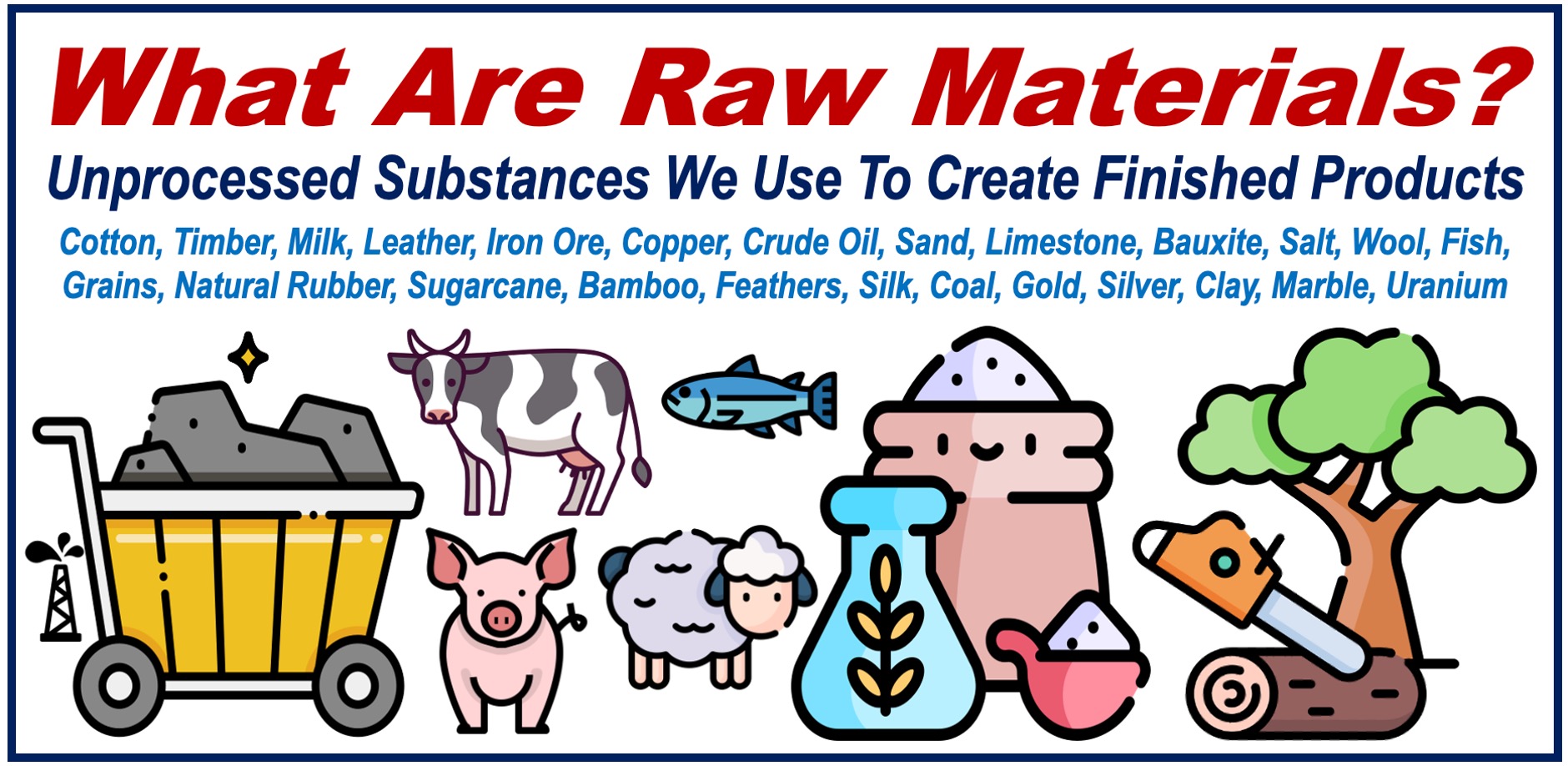Raw Materials, also known as Primary Materials or Primary Commodities, are natural, unprocessed substances that we use to produce goods and services. Oil, minerals, and timber, for example, are raw materials.
They are the basic building blocks used to create almost everything we interact with in our daily lives. Whether it is the metal in your car, the cotton in your clothes, the sand in glass windows, the limestone in cement, or the silicon in computer chips, it all started as a raw material.
The term is not the same as Secondary Raw Materials, which refers to waste material that has been recycled and then used in the production of things.
The Cambridge Dictionary has the following definition of “Raw Material” plus an example of a sentence containing the term:
“1. Any material, such as oil, cotton, or sugar in its natural condition, before it has been processed for use. 2. A substance in its natural state that will be used to make something else in an industrial process.”
“Example Sentence: ‘The increase in operating costs is due to higher energy costs and increases in the price of raw materials such as iron ore.'”
Where Do They Come From?
Raw materials, which are found in their natural state – found in nature – fall into three main categories:
-
Plant-based
These are things like wood, cotton, grains, fruits, rubber, spices, bamboo, hemp, and vegetables.
-
Animal-based
Examples include leather, wool, milk, silk, honey, eggs, and meat.
-
Mineral-based
This category covers metals (like iron, copper, and gold), oil, coal, diamonds, uranium, sand, and other substances we extract from the Earth.

From Raw Material to Finished Product
We rarely use raw materials in their original form. To become useful products, they undergo various transformations:
-
Extraction
Getting the material from its natural source – this could mean harvesting crops, mining rocks, drilling for oil, cutting timber, dredging sand, or fishing.
-
Processing
This often involves changing the material’s form. Logs get sawed into lumber, crude oil is refined into gasoline, iron ore is turned into steel, cotton is spun into thread, milk is pasteurized, and grains are milled into flour.
-
Manufacturing
Here, processed materials are used to create finished products, from cars and computers to houses and clothing, furniture, electronics, packaged foods, and pharmaceuticals.
Direct vs. Indirect Raw Materials
-
Direct Raw Materials
These are the main ingredients in a finished product. Examples include wood in furniture, steel and leather in cars, copper in electrical wiring, and plastic in consumer electronics, or fabric in clothing.
-
Indirect Raw Materials
These play a supporting role in the manufacturing process but are not present in the finished product. Examples include lubricants for machines, adhesives (glues), safety gloves, and packaging materials, and cleaning supplies.
Their Importance
We have been using raw materials since humans first set foot on the Earth. During the Stone Age, we used animal hides for warmth, made spears from wood and stone, and crafted pottery from clay.
Raw materials are the backbone of the global economy. Industries from construction to electronics rely on them. Here’s why they’re so important:
-
Creating Products
Without them, we wouldn’t have the multitude of goods we use every day. There would be no cars, furniture, homes, clothing, electronics, spectacles (glasses), or medicines.
-
Jobs
Millions of people work in industries that deal with extracting, processing, or manufacturing products from raw materials.
-
International trade
Countries often rely on exporting their raw materials or importing materials they lack within their borders. Russia, Brazil, and Australia have an abundance of raw materials and are subsequently major exporters, while Japan, Germany, and S. Korea need to import most of them.
Final Thoughts
Next time you look around, try and count how many things you see that we made came from raw materials. Chances are they make up most of what you see.
Raw materials play a crucial role in our world today – in fact, they always have.
